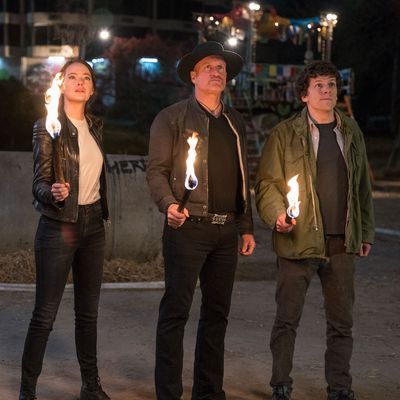
A Zombieland follow-up is the “fetch” of horror comedy — writers Rhett Reese and Paul Wernick have been trying to make it happen for the good part of a decade now. There was talk of a sequel almost immediately after the first film became an unexpected hit in 2009, pushing two of its at-the-time rising stars, Jesse Eisenberg and Emma Stone, toward greater fame. When momentum stalled out, Reese and Wernick turned toward TV, but didn’t get past the pilot stage at Amazon. So back to the big screen, where the pair had since had mammoth hits with the tonally similar Deadpool and Deadpool 2. This time, it took.
Director Ruben Fleischer, fresh off of Venom, is back for Zombieland: Double Tap, as are Eisenberg and Stone, who now have three Oscar nominations and one win between them. Woody Harrelson has returned, as has Abigail Breslin, who turned 13 during the filming of the first film and who looks somewhat annoyed to be playing a sulky teen in this installment. The gang’s finally back together, the budget’s almost doubled, and the result is like piling into a car for a long-discussed road trip with people who suddenly realize they never actually settled on a direction to take, much less a destination.
It’s more illuminating to think about Double Tap as a product of industry forces than a movie, because the movie itself is so creatively threadbare, ironically offering no sense of why anyone, from the audience to the team who made it, would feel any urgency to return to its world. That world, you might recall, is one that’s undergone an undead apocalypse, leaving scattered survivors to make their wary way while adopting aliases based on where they’re from. It’s a setup that’s gory without being intended to be gritty or coherent, as acknowledged in a joke early on in Double Tap in which neurotic hero Columbus (Jesse Eisenberg) is shown reading The Walking Dead and declaring it “terrifying … but totally unrealistic.”
Or is that a “joke”? Zombieland wasn’t the first comedy about zombies, or the first to build awareness of its genre into its sense of humor, but it’s the one that got the most mileage out of self-referentiality, signposting itself with Columbus’s rules for apocalyptic survival (“#1: Cardio”). In the intervening decade, the zom-com has taken off — there are four this year, one directed by Jim Jarmusch — but Double Tap’s approach has remained the same. It makes pop-culture citations that get passed off as punchlines, it breaks the fourth wall (including an opening Eisenberg voiceover acknowledging that people have a lot of options for zombie entertainment these days), and it uses its nightmarish backdrop as an irreverent contrast to its characters’ emotional dramas.
In Double Tap, those desultory developments begin with members of its main foursome chafing against the domesticity of the makeshift family life its members have settled into. Wichita (Stone) is feeling antsy about Columbus’s attempts to get her to commit; her younger sister, Little Rock (Breslin), wants to spread her wings and dislikes her surrogate dad Tallahassee’s (Woody Harrelson) protectiveness. As in the first film, the women abruptly take off, and as in the first film, the men follow, leading to a string of episodic encounters on the journey. Rosario Dawson, as Tallahassee’s Elvis-fan love interest, Nevada, fares the best of the new characters they meet; Avan Jogia as hippie Berkeley and Zoey Deutch as air-headed Madison mostly feel beamed in from bad sketches written last century.
This time around, instead of an amusement park, the final showdown takes place at a compound full of crunchies who have insisted on melting their weapons down and making them into peace-sign pendants. They’re there largely to allow for gun-loving Tallahassee to blow a gasket, but they’re also a sign of how little the concept of Zombieland is actually suited to the continuing storyline its creators have been so insistent that it deserves. The first film coasted along on its relative novelty and the appeal of its leads, owning the silliness with which it treated its dire set-up. The second struggles to balance its wry self-awareness with the fact that the only way it can figure out how to move forward is to have its characters do inexplicable things like flounce off unarmed into the dangerous wilderness or set off celebratory fireworks that then draw massive undead hordes.
How are you supposed to expand a world that wasn’t created to hold together in the first place? Double Tap never figures that out, it just recycles everything it did the first time around, down to the celebrity cameo (consigned to the end credits), in hopes that they still have juice. A winking familiarity is a big selling point for both the Zombielands, but in Double Tap, the first film gets treated not like a previous installment but like the biggest pop-culture reference point of them all. The sequel is a string of callbacks and remember-this moments that ask an awful lot of something whose charms and cultural impact were modest at best — a feature-length effort at congratulating the audience for having shown up for the original film a decade ago.


